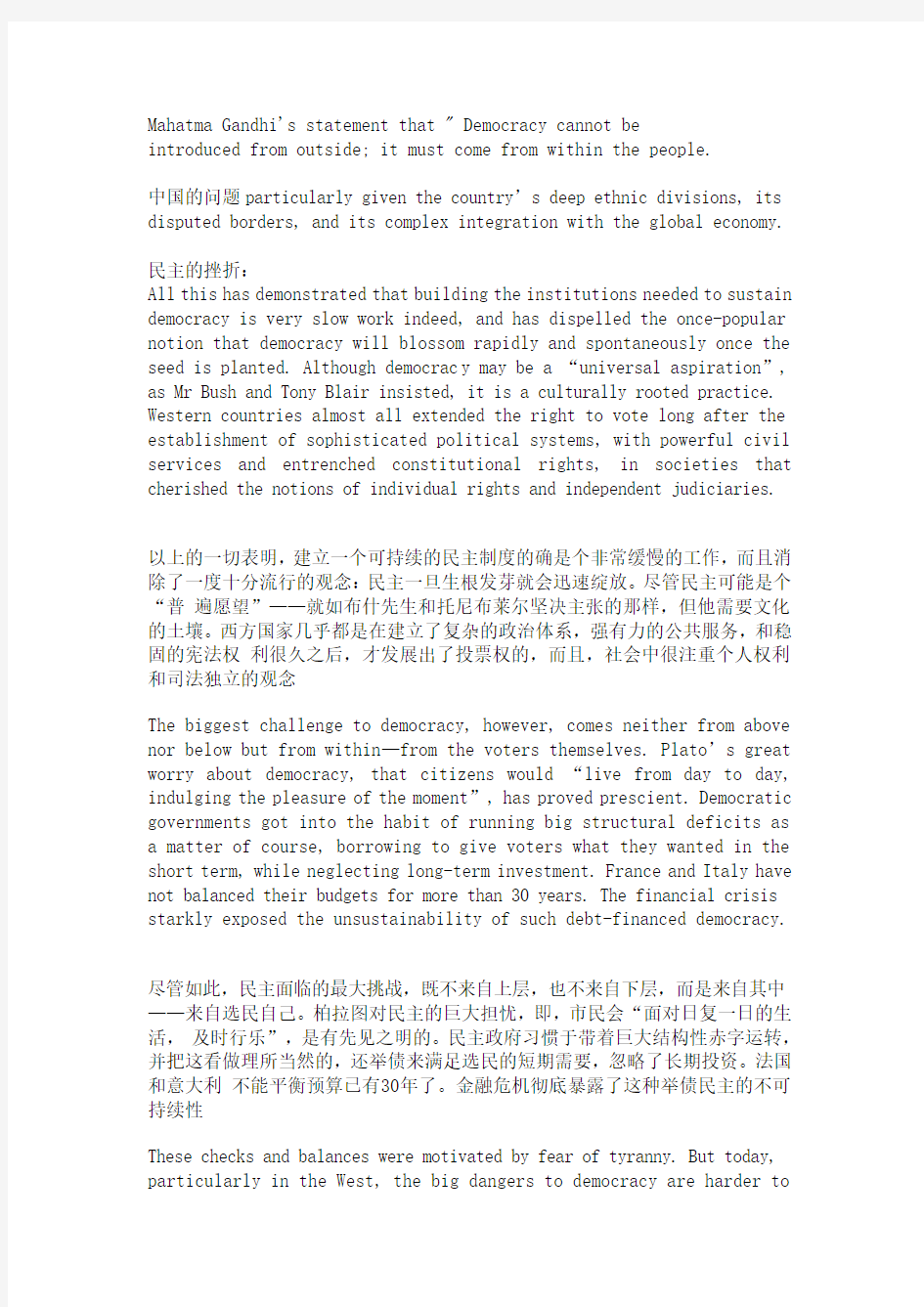Mahatma Gandhi


Mahatma Gandhi's statement that " Democracy cannot be
introduced from outside; it must come from within the people.
中国的问题particularly given the country’s deep ethnic divisions, its disputed borders, and its complex integration with the global economy.
民主的挫折:
All this has demonstrated that building the institutions needed to sustain democracy is very slow work indeed, and has dispelled the once-popular notion that democracy will blossom rapidly and spontaneously once the seed is planted. Although democrac y may be a “universal aspiration”, as Mr Bush and Tony Blair insisted, it is a culturally rooted practice. Western countries almost all extended the right to vote long after the establishment of sophisticated political systems, with powerful civil services and entrenched constitutional rights, in societies that cherished the notions of individual rights and independent judiciaries.
以上的一切表明,建立一个可持续的民主制度的确是个非常缓慢的工作,而且消除了一度十分流行的观念:民主一旦生根发芽就会迅速绽放。尽管民主可能是个“普遍愿望”——就如布什先生和托尼布莱尔坚决主张的那样,但他需要文化的土壤。西方国家几乎都是在建立了复杂的政治体系,强有力的公共服务,和稳固的宪法权利很久之后,才发展出了投票权的,而且,社会中很注重个人权利和司法独立的观念
The biggest challenge to democracy, however, comes neither from above nor below but from within—from the voters themselves. Plato’s great worry about democracy, that citizens would “live from day to day, indulging the pleasure of the moment”, has proved prescient. Democratic governments got into the habit of running big structural deficits as a matter of course, borrowing to give voters what they wanted in the short term, while neglecting long-term investment. France and Italy have not balanced their budgets for more than 30 years. The financial crisis starkly exposed the unsustainability of such debt-financed democracy.
尽管如此,民主面临的最大挑战,既不来自上层,也不来自下层,而是来自其中——来自选民自己。柏拉图对民主的巨大担忧,即,市民会“面对日复一日的生活,及时行乐”,是有先见之明的。民主政府习惯于带着巨大结构性赤字运转,并把这看做理所当然的,还举债来满足选民的短期需要,忽略了长期投资。法国和意大利不能平衡预算已有30年了。金融危机彻底暴露了这种举债民主的不可持续性
These checks and balances were motivated by fear of tyranny. But today, particularly in the West, the big dangers to democracy are harder to
spot. One is the growing size of the state. The relentless expansion of government is reducing liberty and handing ever more power to special interests. The other comes from government’s habit of making promises that it cannot fulfil, either by creating entitlements it cannot pay for or by waging wars that it cannot win, such as that on drugs. Both voters and governments must be persuaded of the merits of accepting restraints on the state’s natural tendency to overreach. Giving control of monetary policy to independent central banks tamed the rampant inflation of the 1980s, for example. It is time to apply the same principle of limited government to a broader range of policies. Mature democracies, just like nascent ones, require appropriate checks and balances on the power of elected government.
这些制约与平衡的动机是出于对暴政的恐惧。但在今天,特别是在西方,民主最大的威胁更难认出。其一是,增长的政府规模。政府不断扩张减少了自由,增加了能够向特殊利益集团输送的权力。其二来自于,政府习惯于做出无法完成的承诺,不管是创造了它无法给予的权益,或者是发动了它无法赢得的战争,这些就像吸毒会成瘾一样。选民和政府都应该被劝导接受限制政权自我膨胀的自然倾向的好处。举例来说,1980年代,让独立的央行制定货币政策去驯服猖獗的通货膨胀。也是时候应用相同的原则,去限制政府在更广泛领域的政策了。成熟的民主国家,同新兴的一样,需要适当的制约和平衡被选举出来的政府的权力了。
中国是人情社会
Absent of that awareness, people bribe officials or pull in their friends to help them settle disputes. It is the sense of justice from the more ‘powerful’ that help disputes settle.
That’s how Chinese society has worked for millennia, and towards rule of law takes time. It’s a cultural transformation.
